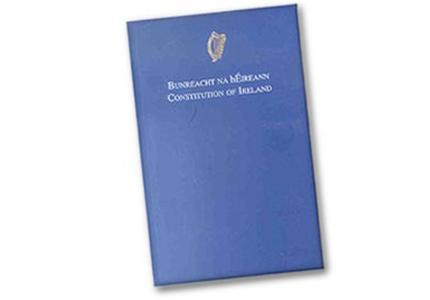Opportunity knocks at constitutional convention

The upcoming constitutional convention could and should be a fantastic opportunity for us to strike at the roots of so many problems in our political system. But the Government’s preliminary proposal for its format leaves a lot to be desired.
It envisions a 100-member assembly made up of a chairperson, 33 politicians and 66 ordinary citizens selected randomly from the electoral register. Among the 33 politicians, each political party in Northern Ireland will be invited to send a representative, which is a positive development. On the other hand though, the assembly’s recommendations won’t be binding, which means it can be ignored and rendered utterly pointless. Another worrying development is that the Government wants the assembly to address a pre-determined list of issues before it is free to raise its own. These issues include same-sex marriage, repealing the blasphemy law, allowing citizens to vote from abroad and other issues that while important aren’t really central to reforming the political system.
The only one of their proposed issues that seems to even touch upon comprehensive reform of the political system is deliberation of our electoral system. But it’s not enough to look at how they’re elected; we need to look at what politicians do once they get elected. The Government appears to want to make just a few cosmetic tweaks without really giving the political system a much-needed shake-up. Perhaps they’re trying to stop this process of change from getting beyond their control.
Or maybe they are committed to reform but they’re just caught up trying to develop this weird format from scratch when they don’t need to. Their plan is to spend the first two months deliberating the relatively minor issues of lowering the voting age and reducing the term-length of the presidency. Their rationale for this is peculiar, as they claim it will serve as a test-run to establish the working methods of the convention. But why would they do this when they could just adopt a proven successful template from elsewhere? They have the experience of plenty of other citizen assemblies to draw upon from countries like Canada, Brazil, the Netherlands and Iceland.
What’s also weird is that their proposed topics seem like relatively straightforward issues, in that they appear to be easily resolved by means of a referendum rather than a lengthy deliberation. On the other hand, complex legislative issues such as the role of the Seanad and children’s rights legislation would be more suited to the deliberative model of a citizens’ assembly. These two issues have taken years for the government and all of their officials to draft legislation for; maybe the fresh eyes of public input would throw up some solutions? Apparently not, as the Government is refusing to include these in the remit of the convention. They’re just putting them straight to a referendum even though they’re the more complicated decisions to make. We’ll have to choose between keeping an ineffective Seanad or getting rid of it. But what if there’s a way to make it work as a genuine check on power? Maybe there isn’t, but is it not worth at least talking about?
These plans, even though they’re just preliminary, could actually stand as just another example of why we need to change our political system. We need to demand a more open convention that could properly examine the appointment and operation of the Dáil, the Cabinet, Seanad, presidency, judiciary, civil service and local government. It should also be free to consider mechanisms to facilitate more public participation in the decision-making process, be they citizen assemblies, citizen-initiated referendums or otherwise.
We could make up for everything that’s happened to this country by holding a real constitutional convention; one where we could introduce reforms politicians wouldn’t have the teeth to. There is no reason why you and your friends can’t get involved in this. In fact, there are already groups such as 2nd Republic who are campaigning with this specifically in mind. Let’s not let a good crisis go to waste.
Recently the people of Iceland were able to reform their Constitution and completely rewrite it from scratch with full public participation in an initiative known as Stjórnlagaráð. If we didn’t follow Iceland’s example with the bankers, let us at least follow their example in this.
